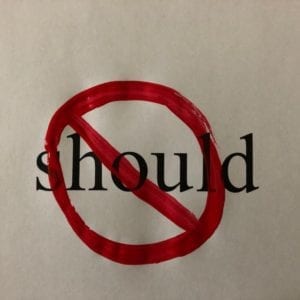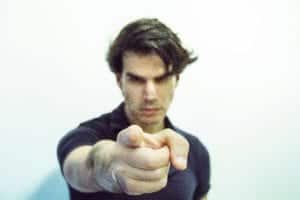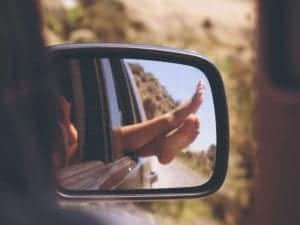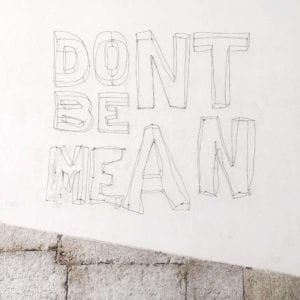When Should a Should be Eliminated?

Would you like to eliminate the word ‘should’ from the dictionary?
I suspect we all say “amen” to the idea of no more ‘shoulds.’ No more pressure or judgments from failure to meet some vague expectation.
No more ‘oughts’.
Nevertheless, my insides speak ‘should’ language with every other thought.
An inner critic is always talking to me, reminding me to do this or that, and I can’t just turn the dial as if it were a radio.
I don’t want to hear any more ‘shoulds,’ which preface every thought lately.

I should be a better person, accomplish more, take a nap, not sleep so much, use more green, a different brush, a lighter touch. I ‘should’ play a piece faster, slower, with more feeling, with less vibrato. I should not be so busy.
Photo by Adi-Goldstein on Unsplash
This list is infinite! I want to remove ‘should’ from the dictionary. I don’t want to see it, and I don’t want to hear it.
Where do “Shoulds” originate?
So, where do all these ‘shoulds’ come from anyway?
Early childhood training is always the first place to blame for the source of ‘oughts.’

You ‘oughta’ clean your plate, wipe your feet,
not let the screen door slam,
be kind to old ladies, work hard, practice,
and don’t put your feet out the window
when the car is moving!
Photo by Anja on Unsplash
But come on!
Early childhood is taking a lot of heat, and as I age, it represents an increasingly smaller percentage of direct commands in my life.
 A lot of ‘shoulds’ seem to come from a misguided attempt to keep others happy…and in so doing, keep my ego smiling and my serotonin levels up.
A lot of ‘shoulds’ seem to come from a misguided attempt to keep others happy…and in so doing, keep my ego smiling and my serotonin levels up.
I suspect ‘should’ also has its place in evolution…guiding us to make choices to preserve our species, but unlike the turtle who trusts his DNA, I keep thinking I ‘should’ move faster, eat less and keep my armor up…in case.
Photo by Ashley Whitlatch on Unsplash
What Happens When We Stop the Shoulds?
So what would happen if I no longer entertained a notion of ‘should’?
I doubt, at this point, my choice would affect the evolution of the species, although it may impact the growth of my development.
The shoulds of my childhood did their job adequately, so today, I have some essential good habits.
And I no longer need to please my parents.
When it comes to pleasing others, I believe they are blessed more by honest caring and compassion than my acting out of duty, which also boosts my serotonin and brings me joy.
So what’s the downside of giving up ‘should’?
Problems to Letting Go of “Should”
I can think of a few problems if there were no ‘should’ in our lexicon.
I would have difficulty communicating with others.
After all, everyone around me has a should list and seems to function quite well with it.
Perhaps these people aren’t honest about what it is like to live in the regime of a dictator.
After a lifetime of experiencing ‘should,’ it becomes normative, and the dictator seems reasonable. Oh how soon we forget the nature of a tyrant
I might not get anything done.
After all, if it isn’t a should, then it can wait. Right?
Well, not necessarily. If I don’t take the roast out of the oven like I ‘should’ it becomes a lump of charred animal flesh no longer fit for consumption.
So I wonder, am I driven by ‘shoulds’ or is there a higher motivation like avoiding waste and stewardship of resources?
If I am no longer responsive to a nagging ‘should-voice,’ will I have the internal imperative to create anything of value?
Will I be able to take the next step toward any goal?
Will I languish in passivity?
Another Way to See a “Should”
If the word is not inherently wrong, what then do we do with a knee-jerk reaction when we hear ‘should’?
I wonder if the energy behind our response isn’t a gift that motivates us to keep on moving, to reach deep into our heart for authenticity and integrity, to rise out of the stance of a prisoner of ‘shoulds’ into the freedom of a life not bounded by rules, laws, paradigms or expectations.
When I eliminate ‘shoulding’ from my language and my life, I not only enter a place of freedom but am guided by a different ethic…a gentler, kinder, more generous ethic–an ethic of love.
I profit from my labors not because I satisfied a should-tyrant but because I am worthy of profit from committed work, motivated by benevolent instincts with which I was born.
Accepting my worthiness can be a lot more complicated than bowing to a tyrant
Some Journal Prompts
Here are some questions that may you may want to use for reflection or as journal prompts to tease out the shoulds in your life.
- How have ‘shoulds’ impacted my life?
- Do I find them tyrannical or companionable?
- What motivation keeps me doing difficult or tedious things?
- What has more power to move me than a ‘should’?
- How might this be depicted in art, poetry, writing, or photography?
Creative Expression as the Answer
This last question is an invitation to Creative Expression and holds the key to setting us free from the tyranny of ‘should.’
 Go ahead and color outside of the lines!
Go ahead and color outside of the lines!
Tear up magazines and make a collage.
Write with crayons.
Use the power of Creativity to set yourself free from the constraints with which you are living.
I like to ignore rules when I write a poem.
I would rather play a piece of music the way I hear it in my heart instead of precisely the way the composer wrote the notes. Photo by Bernard Hermant on Unsplash
And I will add strange spices to a recipe for chili or serve pie in bowls instead of in slices.
It is at these times I begin to experience freedom from the expectations of others and taste life without ‘shoulds.’ I can ‘dance as if no one is looking’… and celebrate.
A Lesson from a Turtle

I wonder about this turtle can teach us as he prepares to cross the road.
Are there shoulds for him? Is he weighing the consequences?
Or does he continue on one step at a time because his eye is on a goal, and he is authentic to who he is?
Does he trust his instincts?
We, humans, are the only species that live with the choral refrain of “should” and are stymied about how to turn the volume down.
My prayer is to be more like the creatures of the forest and sea who have learned to trust their DNA to move them into safety and guide them to necessary sustenance.
I can’t imagine my dog saying to himself, “I should get some sleep because I have a big day tomorrow.”
He trusts his instincts.
I want to believe in mine.


Chris
Just thinking: “should/should not” expressions (whether spoken or thought) suggest a passive response. or at least a conflict of emotions, from one about to make a decision, i.e., “should I or shouldn’t I?” Perhaps we could replace “shoulds” with active responses “will/I will not”?
Ardis Mayo
I like your observation and suggestion, Chris. The challenge now is to remember to override the habit of ‘should’.
Dara Perfit
My Mom had a lot of ” shoulds” in her life and they didn’t serve her well. They came from her parents and from society. If she had been able to let go of them, I believe her emotional life would have been better.
We grow up with expectations which are a kind of “should.” But where do they come from and how do they develop?
I believe that many “shoulds” are self-inflicted and introspection can help deal with them if they get in the way and if one has the energy. We have given ourselves the power to do this now in comparison with the last 100 years.
However, for some, the “shoulds” serve to bring order to their lives despite their possible negative impact. I think this aspect might be analyzed more.
Ardis Mayo
I agree, Dara. ‘Shoulds’ do bring order to our lives, especially when our lives so easily devolve into chaos. (Speaking strictly for myself, here.) And, picking up on Chris’s suggestion of using an active ‘will’ is key to that movement, but finding ‘will’ is easier said than done. Perhaps on the continuum of directive language, these two words are at either end, calling for both/and. A good suggestion for a later post. Thank you.